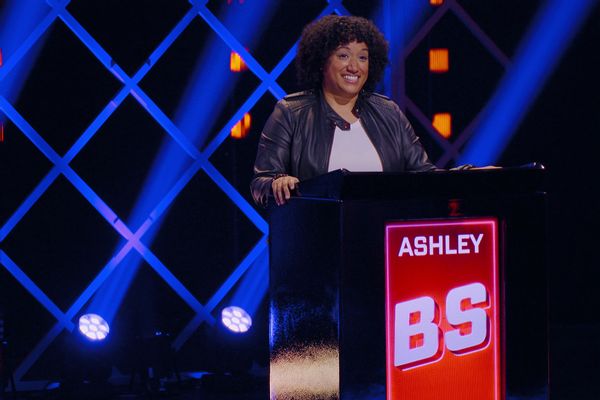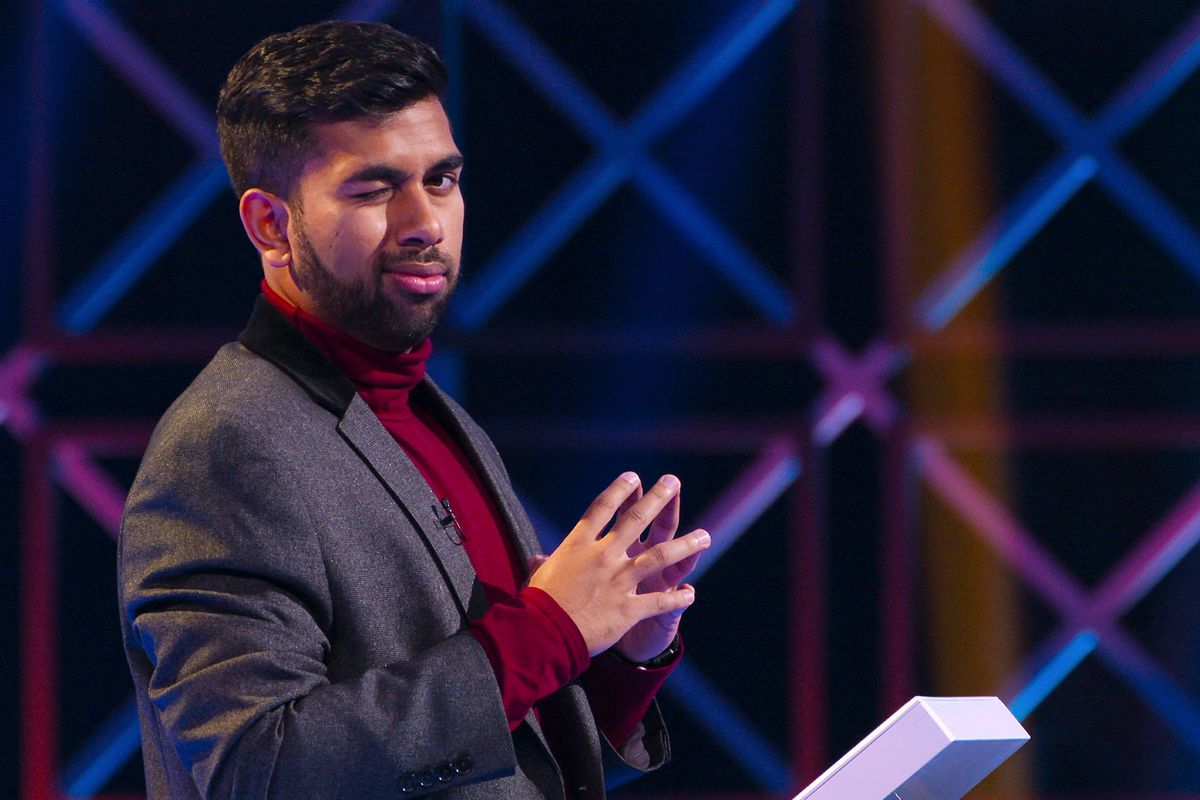Before dismissing Netflix's trivia-based "Bullsh*t: The Game Show" as another passing fancy, remember that it is merely carrying on part of a larger quiz show tradition of lying. In fact, if shows like "Twenty-One" hadn't been exposed for deceiving audiences by feeding answers to some contestants, general knowledge competitions such as "The Weakest Link" and "Jeopardy!" would not be held to regulatory standards prohibiting the rigging of TV contests of intellectual knowledge or skill. This is why we can trust that "Jeopardy!" champions like Ken Jennings or Amy Schneider legitimately earned their winnings.
Oddly, though, such demonstrations of high-level ability elicit disdain from people who associate demonstrations of intellectual prowess with elitism. They prefer people who brag about clawing their way to the mountaintop using nothing but street smarts and guts, and without a fancy education. The honesty of their stories matters less than whether people believe in the myths they spin.
A good enough story can make a man a fortune in the entertainment business, or in the pharmaceutical racket. It can even persuade tens of millions of believers to elect a massively unqualified man to the office of president and then refuse to believe he lost that position four years later. America loves a skilled winner, but it has vastly more affection for people who fake their way to success. This is the intersection at which "Bullsh*t" builds its hill.
RELATED: The sad lack of "Jeopardy!" options
There's no phoning a friend for help if they don't know something. They can only dial into how well they can lie to a stranger's face.
The brilliance of "Bullsh*t," which quietly slid into Netflix's stream on April 27, is that if you've been alive and paying attention to how the world works since the turn of the 21st century, you know how to play it. Mimicking the basic structure of "Who Wants to Be a Millionaire?", contestants are presented with a series of multiple-choice questions which, when answered correctly, net them cash winnings that start at $1,000. This is the starting point on a 10-rung ladder escalating at regular intervals up to $1 million.
However, as the potential winnings incrementally increase – from $1,000 to $10,000, to $25,000, and so on – questions also become more esoteric. But as the show's host Howie Mandel reminds the contestant in the "hot seat," whether they know the real answer matters less than whether they can persuade the three challengers waiting to take their place that they are correct. So the true competition doesn't test a person's smarts. There's no phoning a friend for help if they don't know something. They can only dial into how well they can lie to a stranger's face.
Challengers study the contestant for tells as they defend their answers, registering whether they believe the person or think their reasoning is B.S. The most accurate B.S. detector in the bunch moves into the hot set once the competitor walks away with their winnings or is eliminated. Watch a trailer for "Bulls*it," via YouTube.
These rules level the playing field in ways most quiz shows don't, in that it's plain that the selection process isn't entirely dependent on a person's general knowledge. One's innate entertainment value seems to have equal importance to their intellectual ability in the casting process and that makes Mandel perfect for this job. The entertainer brings the same cheerful "nothing really matters, so let's laugh it up" mien to this gig that he brought to "Deal or No Deal." Suitcase, bullsh*t, it's all money for nothin' at the end of the day.
To match his casual affability, challengers display a range of personalities that favor one role, i.e. the detector, more heavily than the other, the contestant.
There's the exotic dancer who proves to be excellent at sniffing out the pucky but slings it poorly.
There's the lawyer whose job depends on persuading strangers to take his side, and . . . you'll have to watch that one. But his run is way less entertaining than that of the bartender who hosts trivia nights at his establishment, tasked with winning over three especially tough challengers: a graduate student, a high school teacher, and a no-nonsense woman who immediately announces how disappointed she is that Steve Harvey isn't hosting this show.
From here "Bullsh*t" mixes up disconcerting layers of moral complexity underneath the humor, beginning with its means of engaging its audience. Quiz shows aren't designed to be passive viewing experiences; we're encouraged to play along with the contestants, testing our natural intelligence and memory in a stakes-free setting. We don't win or lose any money, but we may learn a few facts and get a better sense of what don't know.
This takes the extra step of forcing us to evaluate how easily we can be bamboozled and how apt the most studious and academically lettered folks can be hoodwinked – and worst, how little we know about the most basic things. The contestant and challenger pool ranges from data specialists to grad students to a tech worker who studied rocket science, but the highest-earning winners in the episodes I saw each worked in careers that pay them to make up stories.
 Host Howie Mandel in "Bullsh*t The Gameshow" (John Golden Britt/Netflix)Yet another unsettling veil envelops each moment, presented in the form of Mandel's sanguine encouragement to contestants to assign an aura of neediness and worthiness to the entire enterprise. Many game shows do this, acknowledging that the only thing better than watching someone play their way into a windfall is knowing the person really, really needs it and will put it to good use.
Host Howie Mandel in "Bullsh*t The Gameshow" (John Golden Britt/Netflix)Yet another unsettling veil envelops each moment, presented in the form of Mandel's sanguine encouragement to contestants to assign an aura of neediness and worthiness to the entire enterprise. Many game shows do this, acknowledging that the only thing better than watching someone play their way into a windfall is knowing the person really, really needs it and will put it to good use.
In unsubtle ways, it encourages us to root for the liars to win.
"Bullsh*t" doesn't overtly cast its contestants as heroes, the heartstring-tugging currency of chance-driven game shows like "The Wall." But in unsubtle ways, it encourages us to root for the liars to win. One woman described her living circumstances in New York City as so desperate that she hangs towels over her windows instead of curtains. Another wept at the chance to realize her father's lifelong dream of owning a horse. Telling adorable stories about one's kids also is a popular tactic – there's so much knowledge to be gained in the simple act of spending time with children.
The catch is that everyone's sob stories and career descriptions might be bullsh*t, too. Which is all in good fun, save for parts where he hails an ace B.S.-dispenser with, "I'm so excited! You are so deserving!" and another who gets further in the game with lying than knowing facts by celebrating how well he's doing despite how badly he'd perform in any other knowledge test.
I'll be honest: "Bullsh*t" is a lightweight spree if you can divorce the show from the context of the times in which we're living – and plenty of people can and do.
Want a daily wrap-up of all the news and commentary Salon has to offer? Subscribe to our morning newsletter, Crash Course.
But contemplate this: we're a culture steeped in false equivalency presented that shuns critical thinking and scoffs at the notion of academically legitimized, peer-reviewed know-how. The producers of "Bullsh*t" know this; they were part of the creative team that brought us "Nailed It!" – another fantastically hilarious competition show.
Where that show subtly critiques the demise of our respect for expertise acquired through study and practice over time, this one promotes the notion that actually knowing stuff has less merit in the public marketplace than pretending like you do. Of course, the most dangerous figures of all are the people who work both ends of the spectrum between absolute truth and made-up manure; we don't need this show to explain Dr. Mehmet Oz or Dr. Ben Carson, or any other public figure who points to their advanced degrees as a means of lending authority their idiocy.
Indeed, maybe we should be a little more surprised that "Bullsh*t" didn't debut at least two years ago, if not before.
Perhaps if it had, the cynical base notes wafting beneath the frivolity would not seem as sharp as it does in the era of The Big Lie – one of many, sadly, ripping our already faltering democracy to shreds.
Then again, it could be that Netflix's almighty algorithm might have rejected that pitch before now. We frogs were still in the low simmer stage of the post-truth cook in 2020 – which is to say, long past being horrified at the Orwellian notion of "alternative facts" but too numbed by the never-ending stream of lies to handle anything more challenging than "The Floor Is Lava."
 Ashley Johnson in "Bullsh*t The Gameshow" (Netflix)Nowadays we may abhor how effective widespread misinformation campaigns have been in, for example, stoking unfounded rumors about election fraud or justifying an insurrection. But we also made hits out of grifter fables like "The Dropout," "Inventing Anna" and documentaries like "The Tinder Swindler." America loves a successful deceiver.
Ashley Johnson in "Bullsh*t The Gameshow" (Netflix)Nowadays we may abhor how effective widespread misinformation campaigns have been in, for example, stoking unfounded rumors about election fraud or justifying an insurrection. But we also made hits out of grifter fables like "The Dropout," "Inventing Anna" and documentaries like "The Tinder Swindler." America loves a successful deceiver.
If more Americans had the most basic education about how viruses spread – and trusted that information, along with the same physicians who have more or less successfully treated them for years – the pandemic might have been over by now.
But the fact that a contestant wasn't believed when she explained how she knew the correct answer to a very basic question about which is disease associated with rusty nails explains a lot. (Tetanus, dammit. The answer is tetanus. Unless you love lockjaw, get vaccinated.)
"Bullsh*t" has blossomed from the soft-brained fertilizer of American unconsciousness in 2022, letting us know exactly who and where we are. I wish I could say I expect better of us, but that would be a lie.
"Bullsh*t: The Game Show" is currently streaming on Netflix.
More stories like this:



Shares